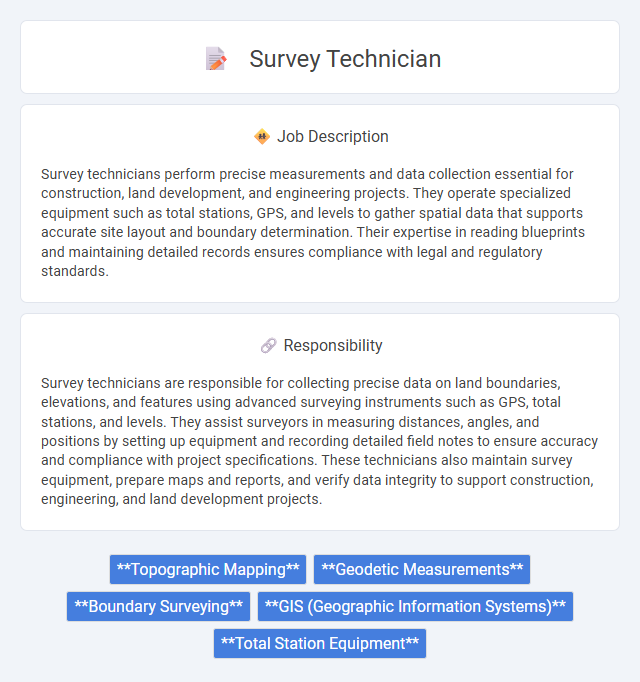
Survey technicians perform precise measurements and data collection essential for construction, land development, and engineering projects. They operate specialized equipment such as total stations, GPS, and levels to gather spatial data that supports accurate site layout and boundary determination. Their expertise in reading blueprints and maintaining detailed records ensures compliance with legal and regulatory standards.
Individuals who enjoy working outdoors and possess strong attention to detail are likely to find a career as a survey technician suitable. Those with good physical stamina and an aptitude for using technical equipment may have a higher probability of success in this role. People who prefer structured, repetitive tasks may be less compatible with the variable and sometimes challenging conditions survey technicians encounter in the field.
Qualification
Survey technicians must possess a high school diploma or equivalent, with many employers preferring candidates who have completed postsecondary education in surveying or geomatics technology. Proficiency in using GPS, total stations, and computer-aided design (CAD) software is essential for accurate data collection and processing. Strong analytical skills, attention to detail, and knowledge of mathematics and geography improve job performance and increase employability in this field.
Responsibility
Survey technicians are responsible for collecting precise data on land boundaries, elevations, and features using advanced surveying instruments such as GPS, total stations, and levels. They assist surveyors in measuring distances, angles, and positions by setting up equipment and recording detailed field notes to ensure accuracy and compliance with project specifications. These technicians also maintain survey equipment, prepare maps and reports, and verify data integrity to support construction, engineering, and land development projects.
Benefit
Survey technician jobs likely offer competitive benefits including health insurance, retirement plans, and paid time off, enhancing overall job satisfaction. The role may provide opportunities for skill development and career advancement, contributing to long-term professional growth. Employees might also enjoy flexible work environments and potential overtime pay, increasing financial stability.
Challenge
Survey technicians likely face challenges related to working in varied and sometimes harsh environmental conditions, which may affect accuracy and efficiency. They probably need to adapt to rapidly evolving technology and equipment, requiring continuous learning and skill updates. Precision in measurement and data interpretation presents ongoing challenges that demand attention to detail and problem-solving abilities.
Career Advancement
Survey technicians gain valuable expertise in land measurement, data collection, and geographic information systems (GIS), which forms the foundation for career advancement. With experience and additional certifications, they can progress to roles such as surveyors, GIS analysts, or project managers, increasing their earning potential and responsibilities. Continuous professional development and mastering advanced surveying technology are critical factors that enhance job prospects and career growth in this field.
Key Terms
Topographic Mapping
Survey technicians specializing in topographic mapping gather precise elevation and landform data using advanced tools such as total stations, GPS, and drones to create detailed maps. They analyze terrain features to assist engineers and planners in construction, environmental management, and land development projects. Accurate topographic data collected by survey technicians ensures efficient project design and helps mitigate potential site challenges.
Geodetic Measurements
Survey technicians specializing in geodetic measurements utilize advanced instruments such as total stations, GPS, and laser scanners to accurately determine earth surface positions and elevations. They analyze spatial data to support the creation of topographic maps, boundary assessments, and construction layouts, ensuring precise geospatial data integration. Proficiency in coordinate systems, geodetic datums, and data processing software is essential to maintain measurement accuracy and project reliability.
Boundary Surveying
Boundary surveying involves accurately measuring and mapping property lines to establish legal land ownership boundaries. Survey technicians utilize advanced tools like GPS, total stations, and geographic information systems (GIS) to collect and analyze spatial data essential for property dispute resolution and land development projects. Expertise in boundary surveying ensures compliance with legal standards and helps prevent encroachments or boundary conflicts.
GIS (Geographic Information Systems)
Survey technicians specializing in Geographic Information Systems (GIS) play a critical role in collecting, managing, and analyzing spatial data to support land development and environmental projects. They utilize advanced GIS software such as ArcGIS and QGIS to create detailed maps, conduct spatial analysis, and ensure data accuracy for construction, urban planning, and resource management. Proficiency in GPS technology, data modeling, and cartography is essential for survey technicians to deliver precise geospatial information that aids decision-making and regulatory compliance.
Total Station Equipment
Survey technicians expertly operate Total Station equipment, a critical tool combining electronic theodolite and distance measurement technology to capture precise land measurements. Mastery of Total Station systems enables accurate data collection for topographic surveys, construction site layout, and boundary determination. Proficient use of Total Station enhances project efficiency by delivering real-time coordinates and detailed spatial data critical for engineering and mapping applications.
 kuljobs.com
kuljobs.com